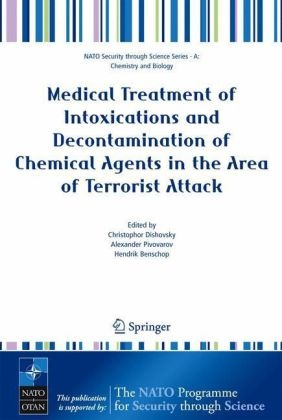Read more
This book contains unique contributions in the area of defense against chemical terrorism by experts from former Warsaw Pact countries. Decontamination and medical treatment are important aspects of protection from effects after intoxications with chemical agents. The book covers topics including new approaches in pre-treatment and prophylaxis of nerve agent intoxication, and diagnosis of exposure to chemical agents.
List of contents
Preface.- Acknowledgements.- Key Speakers.- Other Participants.- Part 1. Current Problems of Chemical Terrorism.- 1. Problems of Chemical Terrorism and Ways of its Overcoming; C. Dishovsky.- 2. Toxic Chemicals and Radioactive Substances as Reason of Occurrence of Acute Poisoning in Ukraine; S. Ryzhenko.- 3. Biomonitoring of Exposure to Chemical Warfare Agents; D. van Noort et al.- 4. Non-ruled Market Economy as a Source of Chemical Terrorism. Automotive Fuel: Quality and Environmental Safety; W. Zadorsky.- 5. Role of the Chemical Weapons Convention in Combating Chemical Terrorism; J. Matousek.- 6. Chemical Incident Simulator: a New Approach for Deriving Passive Defence Requirements; M.J.G. Linders et al. 7. OPCW Concept of Assistance Under Article X; C.L. Brown.- 8. Environmentally Hazardous Projects in Ukraine as Attractive Targets for Terrorists Acts; G. Shmatkov.- 9. Dioxins: Threat of Misuse in Possible Acts of Chemical Terrorism; V.F. Tkach et al.- Part 2. Diagnosis of Exposure to Chemcial Agents and Medical Treatment of Chemical Agent Intoxication.- 10. Epidemiology of Chemical Crisis, Public Health Impact, Specific Medical Countermeasures and Education; F. Paul, L. Paul.- 11. Modern Approaches to Medical Treatment of Poisoning Caused by Neuroparalitics Anticholinesterase Compounds; N.V. Kokshareva et al.- 12. Certain Problems of Rendering Medical Assistance Under Acts of Chemical Terrorism; S.I. Khmel et al.- 13. Efficacy of Pretreatment and Treatment Against Soman Intoxication; I.H.C.H.M. Philippens et al.- 14. Biomedical Sampling Following a Chemical Warfare Agent Terrorist Event An OPCW Perspective; M. Rowell.- 15. Particularities in Research, Production and Acquisition of the Pharmaceutical Products for NBC Medical Protection; F. Paul.- 16. Toxicokinetics in Helping of Diagnoses and Treatment of Chemical Poisoning; M. Juruli.- Part 3. Development of Personal Decontamination in Case of Intoxication with Chemical Agent.- 17. Aspects of Decontamination in Case of Release of Toxic Substances or Use of Chemical Warfare Agent; T. Popov, G. Popov.- 18. Personal Decontamination in Cases of Chemical Terrorist Attacks; J. Matousek.- 19. Harmful Chemical Industry Incidents Effects Prognosis System of the Territorial Center for Emergency Medicine: Supply of Information and Analysis Data; A. Kolyada.- 20. Purification of Drinking Water from 134, 137 Cs, 89, 90 Sr, 60 Co and 129 I; R.A. Khaydarov, R.R. Khaydarov.- 21. Research of Decontamination Efficiency of Contaminated Camouflage Clothing with Applied Methods and Means in the Republic of Bulgaria; T. Popov, G. Popov.- 22. Alleviation of Toxic Impact of Chemical Agents on Human Organism; T. Vasylyeva et al.- 23. Using of Cold Plasma for Purification of Chemically Polluted Water in Extreme Period; A.A. Pivovarov, A.P. Tischenko.- 24. The Role of Clinical Toxicology in Minimizing Adverse Health Effects Related to Chemical Disasters; G. Katsitadz, M. Juruli.- 25. Prevention of Gas Seeping into Buildings Through Constructive Materials; R.A. Khaydarov et al.- 26. Biological Method for the Water, Food, Fodders and Environmental Toxic Chemical Materials Contamination Indication; L.I. Pozdnyakova et al.- Index.-
Summary
This book includes reports which were presented at a NATO Advanced Research Workshop (ARW) entitled “Medical Treatment of Intoxications and Decontamination of Chemical Agent in the Area of Terrorist Attack”. The workshop was held on 25-28 January 2005 in Dnepropetrovsk, Ukraine. Currently, scientists and experts from many countries are working on development and implementation of a readiness for anti terrorist actions. In addition to chemical weapons, terrorists can use various toxic chemicals from chemical industry, agriculture or products released from terrorist acts on industrial facilities. The arsenal of chemical agents that can be used as terrorist agents is practically unlimited. The focus of this workshop was assessment of scientific concepts and practical means for management of chemical agent casualties in the area of terrorist attack with emphasis on improving the medical treatment and decontamination. These problems were analyzed from an interdisciplinary perspective. The primary objective of the ARW was to provide countries in which chemical-defense systems are currently under development with the experience and expertise of those that are more advanced and/or have already been exposed and responded to a chemical-terrorist attack. . The main areas covered were: 1. new approaches in pre-treatment and prophylaxis of nerve agent intoxication; 2. diagnosis of exposure to chemical agents ; 3. therapy of chemical agent intoxication; 4. development of personal decontamination; 5. decontamination of intoxication with chemical agents.

